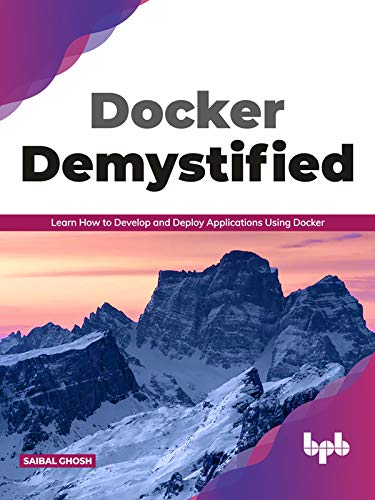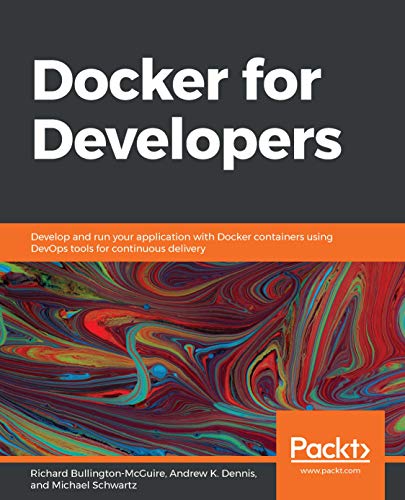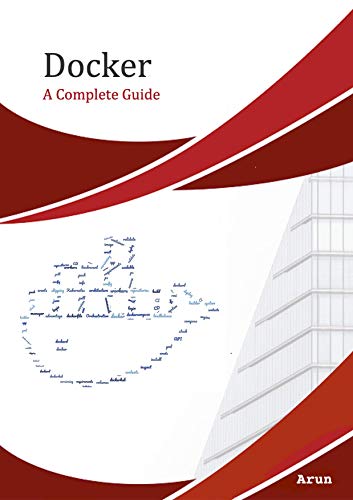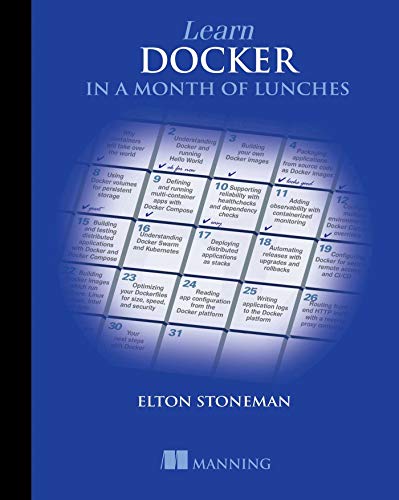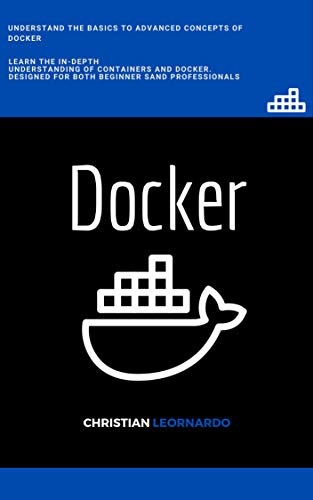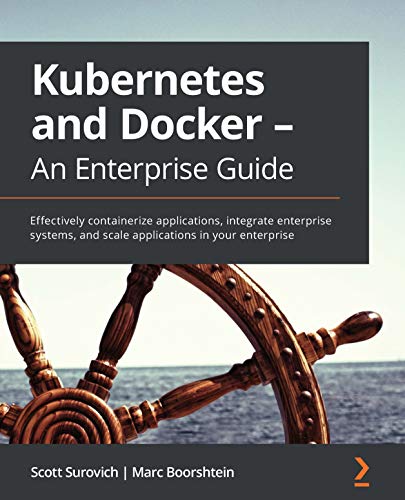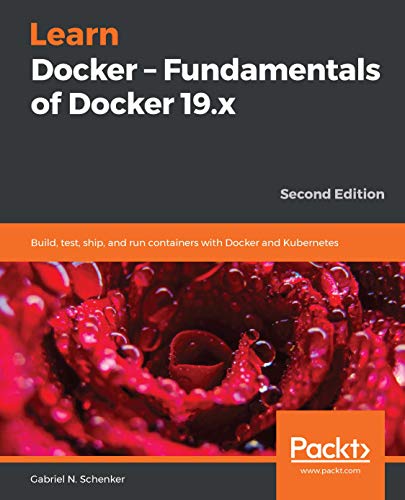BuildVirtual may earn a commission for purchases made through links in this page. Learn more
Build robust and secure applications using the building blocks of Docker Key Features. Understand the fundamentals of Containers. Understand the working of the entire Docker ecosystem. Learn how to utilize Docker Networking capabilities to its fullest. Learn how to secure Docker Containers. Get familiar and work with Docker Enterprise Edition. DescriptionThe book starts by introducing Containers and explains how they are different from virtual machines, and why they are the preferred tool for developing applications.You will understand the working of Images, Containers, and their associated Storage and will see how all the moving parts bind together to work synchronously.
The book will then focus on Docker Swarm, the mechanism for orchestrating several running Docker containers. It then delves deeper into Docker Networking. . Towards the end, you will learn how to secure your applications, especially by leveraging the native features of Docker Enterprise Edition.What will you learn Learn how to use Docker Images. Get to know more about Docker Storage. Learn how to use Volume plugins in Docker services. Learn how to deploy a service to the Swarm. Learn how to manage, scale, and maintain containerized applications. Who this book is for This book is for anyone who is looking to learn Docker. It is also useful for professionals who are looking to build and deploy web apps using Docker.Table of Contents 1. Introduction to Containerization and Docker2. Containers and Images3. Storage Drivers and Volumes4. The Container Network Model and the Docker Bridge5. Docker Swarm6. Docker Networking7. Docker Security-18. Docker Security-IIAbout the Authors Saibal Ghosh has spent a substantial part of his career working with databases. However, in the last few years, he gravitated towards the cloud, cloud security, and newer technologies like Docker and Kubernetes. He has developed a deep understanding of these concepts and technologies bolstered by the insight gained from many years of experience working with applications, databases, storage and infrastructure, and the understanding of how data is stored, moved, and secured.He currently works as a Principal Architect in Ericsson India Ltd. and spends a substantial amount of time playing around with Docker and Kubernetes. He holds numerous certifications around applications, databases, cloud, and cloud security and is also a member of Leader’s Excellence, Harvard Square.
Develop and run your application with Docker containers using DevOps tools for continuous delivery
Learn how to deploy and test Linux-based Docker containers with the help of real-world use casesKey FeaturesUnderstand how to make a deployment workflow run smoothly with Docker containersLearn Docker and DevOps concepts such as continuous integration and continuous deployment (CI/CD)Gain insights into using various Docker tools and librariesBook DescriptionDocker is the de facto standard for containerizing apps, and with an increasing number of software projects migrating to containers, it is crucial for engineers and DevOps teams to understand how to build, deploy, and secure Docker environments effectively
Docker for Developers will help you understand Docker containers from scratch while taking you through best practices and showing you how to address security concerns.Starting with an introduction to Docker, you’ll learn how to use containers and VirtualBox for development. You’ll explore how containers work and develop projects within them after you’ve explored different ways to deploy and run containers. The book will also show you how to use Docker containers in production in both single-host set-ups and in clusters and deploy them using Jenkins, Kubernetes, and Spinnaker. As you advance, you’ll get to grips with monitoring, securing, and scaling Docker using tools such as Prometheus and Grafana. Later, you’ll be able to deploy Docker containers to a variety of environments, including the cloud-native Amazon Elastic Kubernetes Service (Amazon EKS), before finally delving into Docker security concepts and best practices.By the end of the Docker book, you’ll be able to not only work in a container-driven environment confidently but also use Docker for both new and existing projects.What you will learnGet up to speed with creating containers and understand how they workPackage and deploy your containers to a variety of platformsWork with containers in the cloud and on the Kubernetes platformDeploy and then monitor the health and logs of running containersExplore best practices for working with containers from a security perspectiveBecome familiar with scanning containers and using third-party security tools and librariesWho this book is forIf you’re a software engineer new to containerization or a DevOps engineer responsible for deploying Docker containers in the cloud and building DevOps pipelines for container-based projects, you’ll find this book useful. This Docker containers book is also a handy reference guide for anyone working with a Docker-based DevOps ecosystem or interested in understanding the security implications and best practices for working in container-driven environments.Table of ContentsIntroduction to DockerUsing VirtualBox and Docker Containers for DevelopmentSharing Containers Using Docker HubComposing Systems Using ContainersAlternatives for Deploying and Running Containers in ProductionDeploying Applications with Docker ComposeContinuous Deployment with JenkinsDeploying Docker Apps to KubernetesCloud-Native Continuous Deployment Using SpinnakerMonitoring Docker Using Prometheus, Grafana, and Jaeger Scaling and Load Testing Docker ApplicationsIntroduction to Container SecurityDocker Security Fundamentals and Best PracticesAdvanced Docker Security – Secrets, Secret Commands, Tagging, and LabelsScanning, Monitoring, and Using Third-Party ToolsConclusion – End of the Road, but not the Journey
This book has been created considering the issues that a beginner faces while learning a new technology. This book focusses mainly on the commands and the practical aspects of the technology.Docker is a great technology and is in demand and thus this book helps the reader to understand and learn the technology in a very simple and smooth manner. The book tries to cover almost all the practice cases, errors and difficulties that a beginner faces while learning.
Learn Docker in a Month of Lunches
Summary Go from zero to production readiness with Docker in 22 bite-sized lessons! Learn Docker in a Month of Lunches is an accessible task-focused guide to Docker on Linux, Windows, or Mac systems. In it, you’ll learn practical Docker skills to help you tackle the challenges of modern IT, from cloud migration and microservices to handling legacy systems. There’s no excessive theory or niche-use cases—just a quick-and-easy guide to the essentials of Docker you’ll use every day. Purchase of the print book includes a free eBook in PDF, Kindle, and ePub formats from Manning Publications.
Summary Go from zero to production readiness with Docker in 22 bite-sized lessons! Learn Docker in a Month of Lunches is an accessible task-focused guide to Docker on Linux, Windows, or Mac systems. In it, you’ll learn practical Docker skills to help you tackle the challenges of modern IT, from cloud migration and microservices to handling legacy systems. There’s no excessive theory or niche-use cases—just a quick-and-easy guide to the essentials of Docker you’ll use every day. Purchase of the print book includes a free eBook in PDF, Kindle, and ePub formats from Manning Publications.About the technology The idea behind Docker is simple: package applications in lightweight virtual containers that can be easily installed. The results of this simple idea are huge! Docker makes it possible to manage applications without creating custom infrastructures. Free, open source, and battle-tested, Docker has quickly become must-know technology for developers and administrators. About the book Learn Docker in a Month of Lunches introduces Docker concepts through a series of brief hands-on lessons. Following a learning path perfected by author Elton Stoneman, you’ll run containers by chapter 2 and package applications by chapter 3. Each lesson teaches a practical skill you can practice on Windows, macOS, and Linux systems. By the end of the month you’ll know how to containerize and run any kind of application with Docker. What’s inside Package applications to run in containers Put containers into production Build optimized Docker images Run containerized apps at scale About the reader For IT professionals. No previous Docker experience required. About the author Elton Stoneman is a consultant, a former architect at Docker, a Microsoft MVP, and a Pluralsight author. Table of Contents PART 1 – UNDERSTANDING DOCKER CONTAINERS AND IMAGES 1. Before you begin 2. Understanding Docker and running Hello World 3. Building your own Docker images 4. Packaging applications from source code into Docker Images 5. Sharing images with Docker Hub and other registries 6. Using Docker volumes for persistent storage PART 2 – RUNNING DISTRIBUTED APPLICATIONS IN CONTAINERS 7. Running multi-container apps with Docker Compose 8. Supporting reliability with health checks and dependency checks 9. Adding observability with containerized monitoring 10. Running multiple environments with Docker Compose 11. Building and testing applications with Docker and Docker Compose PART 3 – RUNNING AT SCALE WITH A CONTAINER ORCHESTRATOR 12. Understanding orchestration: Docker Swarm and Kubernetes 13. Deploying distributed applications as stacks in Docker Swarm 14. Automating releases with upgrades and rollbacks 15. Configuring Docker for secure remote access and CI/CD 16. Building Docker images that run anywhere: Linux, Windows, Intel, and Arm PART 4 – GETTING YOUR CONTAINERS READY FOR PRODUCTION 17. Optimizing your Docker images for size, speed, and security 18. Application configuration management in containers 19. Writing and managing application logs with Docker 20. Controlling HTTP traffic to containers with a reverse proxy 21. Asynchronous communication with a message queue 22. Never the end
Docker for the Absolute Beginner
Docker is an open platform for developers and sysadmins to build, ship, and run distributed applications, whether on laptops, data center VMs, or the cloud.This book introduces Docker to an Absolute Beginner using really simple and easy to understand lectures. This course is designed for beginners in DevOps.Who this book is for:System AdministratorsCloud Infrastructure EngineersDevelopers
Apply Kubernetes beyond the basics of Kubernetes clusters by implementing IAM using OIDC and Active Directory, Layer 4 load balancing using MetalLB, advanced service integration, security, auditing, and CI/CDKey FeaturesFind out how to add enterprise features to a Kubernetes cluster with theory and exercises to guide youUnderstand advanced topics including load balancing, externalDNS, IDP integration, security, auditing, backup, and CI/CDCreate development clusters for unique testing requirements, including running multiple clusters on a single server to simulate an enterprise environmentBook DescriptionContainerization has changed the DevOps game completely, with Docker and Kubernetes playing important roles in altering the flow of app creation and deployment
This book will help you acquire the knowledge and tools required to integrate Kubernetes clusters in an enterprise environment.The book begins by introducing you to Docker and Kubernetes fundamentals, including a review of basic Kubernetes objects. You’ll then get to grips with containerization and understand its core functionalities, including how to create ephemeral multinode clusters using kind. As you make progress, you’ll learn about cluster architecture, Kubernetes cluster deployment, and cluster management, and get started with application deployment. Moving on, you’ll find out how to integrate your container to a cloud platform and integrate tools including MetalLB, externalDNS, OpenID connect (OIDC), pod security policies (PSPs), Open Policy Agent (OPA), Falco, and Velero. Finally, you will discover how to deploy an entire platform to the cloud using continuous integration and continuous delivery (CI/CD).By the end of this Kubernetes book, you will have learned how to create development clusters for testing applications and Kubernetes components, and be able to secure and audit a cluster by implementing various open-source solutions including OpenUnison, OPA, Falco, Kibana, and Velero.What you will learnCreate a multinode Kubernetes cluster using kindImplement Ingress, MetalLB, and ExternalDNSConfigure a cluster OIDC using impersonationMap enterprise authorization to KubernetesSecure clusters using PSPs and OPAEnhance auditing using Falco and EFKBack up your workload for disaster recovery and cluster migrationDeploy to a platform using Tekton, GitLab, and ArgoCDWho this book is forThis book is for anyone interested in DevOps, containerization, and going beyond basic Kubernetes cluster deployments. DevOps engineers, developers, and system administrators looking to enhance their IT career paths will also find this book helpful. Although some prior experience with Docker and Kubernetes is recommended, this book includes a Kubernetes bootcamp that provides a description of Kubernetes objects to help you if you are new to the topic or need a refresher.Table of ContentsDocker and Containers EssentialsWorking with Docker DataUnderstanding Docker NetworkingDeploying Kubernetes using KindKubernetes BootcampServices, Load Balancing, and External DNSIntegrating Authentication into your ClusterRBAC Policies and AuditingDeploying a Secured Kubernetes DashboardCreating Pod Security PoliciesExtending Security using Open Policy Agent Auditing using Falco and EFKBacking up WorkloadsProvisioning a Platform
Explore the core functionality of containerizing your applications and making them production-ready Key Features Grasp basic to advanced Docker concepts with this comprehensive guide Get acquainted with Docker containers, Docker images, orchestrators, cloud integration, and networking Learn to simplify dependencies and deploy and test containers in production Book Description Containers enable you to package an application with all the components it needs, such as libraries and other dependencies, and ship it as one package. Docker containers have revolutionized the software supply chain in both small and large enterprises.
Starting with an introduction to Docker fundamentals and setting up an environment to work with it, you’ll delve into concepts such as Docker containers, Docker images, and Docker Compose. As you progress, the book will help you explore deployment, orchestration, networking, and security. Finally, you’ll get to grips with Docker functionalities on public clouds such as Amazon Web Services (AWS), Azure, and Google Cloud Platform (GCP), and learn about Docker Enterprise Edition features. Additionally, you’ll also discover the benefits of increased security with the use of containers. By the end of this Docker book, you’ll be able to build, ship, and run a containerized, highly distributed application on Docker Swarm or Kubernetes, running on-premises or in the cloud. What you will learn Containerize your traditional or microservice-based applications Develop, modify, debug, and test an application running inside a container Share or ship your application as an immutable container image Build a Docker Swarm and a Kubernetes cluster in the cloud Run a highly distributed application using Docker Swarm or Kubernetes Update or rollback a distributed application with zero downtime Secure your applications with encapsulation, networks, and secrets Troubleshoot a containerized, highly distributed application in the cloud Who this book is for This book is for Linux professionals, system administrators, operations engineers, DevOps engineers, and developers or stakeholders who are interested in getting started with Docker from scratch. No prior experience with Docker containers is required. Users with a Linux system would be able to take full advantage of this book.Table of Contents What Are Containers and Why Should I Use Them? Setting Up a Working Environment Mastering Containers Creating and Managing Container Images Data Volumes and Configuration Debugging Code Running in Containers Using Docker to Supercharge Automation Advanced Docker Usage Scenarios Distributed Application Architecture Single-Host Networking Docker Compose Orchestrators Introduction to Docker Swarm Zero-Downtime Deployments and Secrets Introduction to Kubernetes Deploying, Updating, and Securing an Application with Kubernetes Monitoring and Troubleshooting an App Running in Production Running a Containerized App in the Cloud
